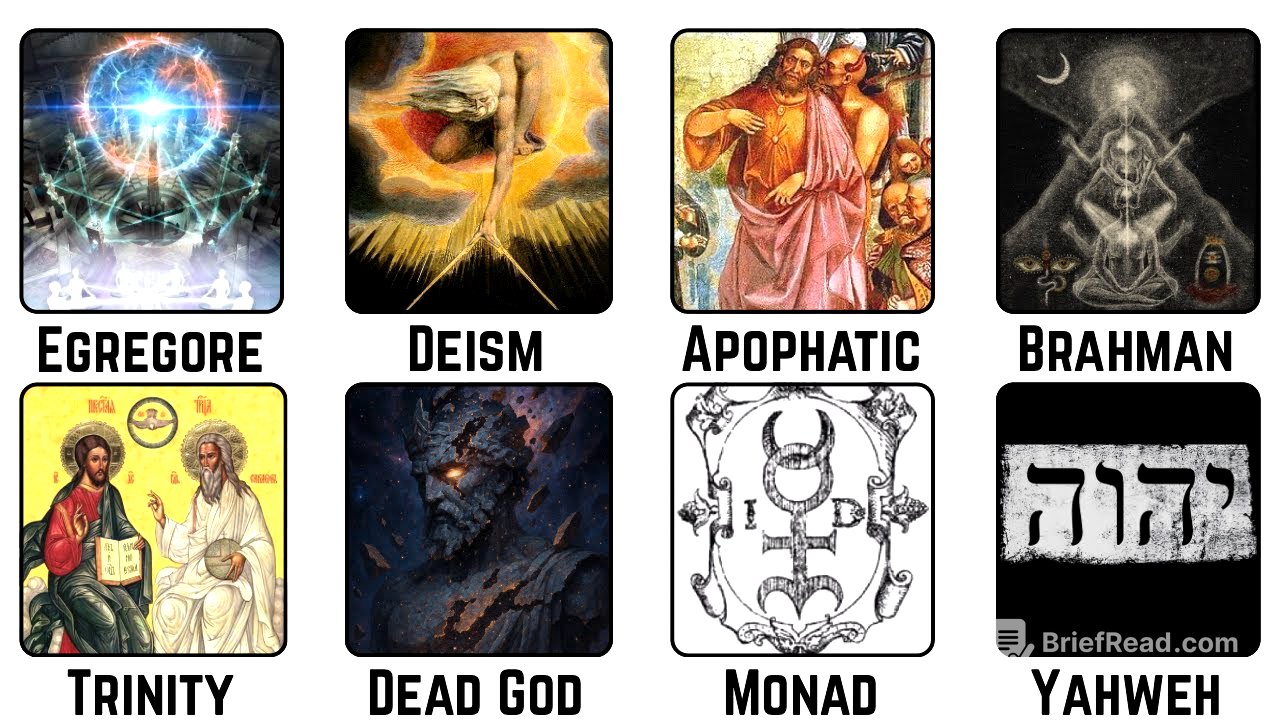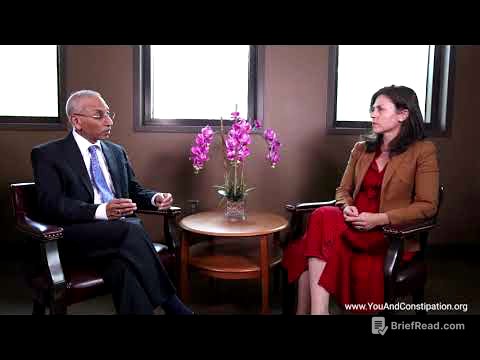TLDR;
This video explores various conceptions of God and the divine, ranging from collective thought-forms to abstract philosophical principles. It covers concepts like egregore, deism, apophatic theology, Brahman, the Trinity, the "dead God" concept, the Monad, and Yahweh, providing insights into how different traditions and philosophies understand the nature of the divine and its relationship to humanity.
- Egregore: A collective mind-form created by shared beliefs and emotions.
- Deism: God as a cosmic watchmaker who sets the universe in motion but does not interfere.
- Apophatic God: Understanding God by focusing on what God is not, emphasizing unknowability.
- Brahman: The ultimate, formless reality in Hindu philosophy.
- Trinity: The Christian concept of one God in three persons: Father, Son, and Holy Spirit.
- Dead God: Nietzsche's idea that the traditional concept of God has lost its power in modern society.
- Monad: The ultimate starting point of everything, pure unity beyond description.
- Yahweh: The personal and covenantal God of Israel in the Hebrew Bible.
Egregore [0:00]
An egregore is a collective mind or spiritual thought form that emerges when a group of people focuses on the same idea, belief, ritual, or emotion. This shared energy creates an invisible entity that feeds on the group's attention and, in turn, influences them. These entities can be sustained by the loyalty and rituals of groups like secret societies, growing stronger with increased belief and energy. While not inherently good, egregores can become destructive if fueled by collective obsessions like fear or hate, blurring the lines between psychology and spirituality. Unlike a transcendent god, an egregore is created by human focus and imagination, potentially outliving its creators and taking on a life of its own.
Deism [1:09]
Deism views God as a cosmic watchmaker who designed the universe and set it in motion, allowing it to run on its own without intervention. Popular during the Enlightenment, deism sought a God that aligned with science and reason, rejecting miracles and divine interventions. Deists believed God reveals himself through nature and natural laws, establishing the rules of the universe but not interfering with its daily operations. Deism often rejects organized religion and supernatural claims, advocating for the study of creation as true worship. Figures like Thomas Jefferson and Voltaire were known for their deistic leanings, viewing God as a principle of reason and order rather than a personal, interventionist deity.
Apophatic God [2:26]
The apophatic view of God, or negative theology, focuses on describing what God is not, rather than what God is. This approach stems from the belief that God is beyond human understanding, making every descriptive word inadequate. Apophatic thinkers strip away imperfect descriptions, asserting that God is not weak, finite, or limited. This concept appears in early Christianity, Judaism, and Islam, where silence is often valued over words in approaching the divine mystery. By removing labels, one gets closer to sensing God's vastness, acknowledging that human language cannot fully capture the divine. Critics argue that if God cannot be described, nothing can be known about God, but apophatic mystics believe the truest knowledge of God comes from realizing unknowability.
Brahman [3:54]
In Hindu philosophy, Brahman is the ultimate reality and the absolute foundation of everything. It is described as the ocean of existence, with gods, humans, and galaxies being mere waves on its surface. Unlike gods with personalities, Brahman is formless, timeless, infinite, and beyond all descriptions, representing pure being, consciousness, and bliss. Brahman is eternal, unchanging, and the ground of all existence, with every living soul (Atman) considered identical to Brahman at its core. While Brahman is an abstract concept, Hinduism offers various ways to relate to it, either as pure unity or through personal forms like Vishnu, Shiva, or Devi, facilitating connection through devotion.
Trinity [5:09]
The Trinity is a unique Christian doctrine describing God as one divine essence expressed in three distinct persons: the Father, the Son (Jesus Christ), and the Holy Spirit. It is not three separate gods, nor one God with three masks, but a mysterious unity where all three are fully God, co-eternal, and co-equal, yet distinct in their roles. The Father is the creator, the Son is God in human form for salvation, and the Holy Spirit is God's active presence. Early Christian thinkers used the concept of "paracoresis," an eternal dance of love and unity, to explain the Trinity. Despite being a paradox to human logic, the Trinity captures the idea that God is relationship, love, unity, and diversity all at once.
Dead God [6:30]
The phrase "God is dead," coined by philosopher Friedrich Nietzsche, signifies that the traditional idea of God as the foundation of truth, morality, and meaning in Western society has lost its power. Nietzsche argued that science, rationalism, and secular thought had eroded the traditional belief in God. He warned that without God, humanity risks falling into nihilism, a sense that nothing matters. Nietzsche challenged society to create new values and meaning in place of the lost divine authority, urging humanity to rise as "overmen" who shape life with courage. The concept is not about atheism being right or wrong, but about the crisis that arises when the old framework of belief collapses.
Monad [7:47]
The Monad is the ultimate starting point of everything, described in Neoplatonism as "the One"—pure unity beyond description. It lacks form, voice, or emotions, and is not a being like traditional gods, but rather the source code of reality itself: invisible, eternal, and unchanging. Reality flows outward from the Monad in layers, starting with pure thought (noose), then the world's soul, and finally the physical universe. In Gnostic traditions, the Monad is the unknowable god beyond gods, uninvolved with the flawed physical world. Spiritual beings called aons emanate from the Monad, with one of these giving rise to the demiurge, the creator of the material world. The goal for seekers is to return to the Monad, reconnecting with pure unity beyond illusion.
Yahweh [9:10]
In the Hebrew Bible, Yahweh is the God of Israel, personal, covenantal, and deeply involved in history. Unlike abstract concepts like the Monad or Brahman, Yahweh reveals himself through words, actions, and a relationship with his people. His name, often translated as "I am who I am," signifies his eternal, self-existent nature. Yahweh is both transcendent and imminent, being the creator of the heavens and the earth while also hearing prayers and delivering the oppressed. He enters into a covenant with Abraham, Moses, and the people of Israel, providing the Torah to guide them toward justice and holiness. Central to Yahweh is the idea of oneness, as expressed in the Shama prayer, setting ancient Israel apart from polytheistic cultures through a covenant relationship based on faithfulness, loyalty, and obedience.









